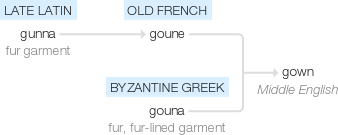Gown
Middle English: from Old French goune, from late Latin gunna ‘fur garment’; probably related to Byzantine Greek gouna ‘fur, fur-lined garment’.
wiktionary
From Anglo-Norman gune, goune(“fur-trimmed coat, pelisse”), from Old French goune, from Late Latin gunna(“leather garment, a fur”), from Ancient Greek γούνα(goúna, “coarse garment”), of unknown origin. Perhaps from a Balkan or Apennine language. [1] Alternatively, perhaps from Scythian, from Proto-Iranian *gawnám(“fur”) (compare Younger Avestan 𐬔𐬀𐬊𐬥𐬀 (gaona, “body hair”) and Ossetian гъун(ǧun)).(Can this(+) etymology be sourced?).
etymonline
gown (n.)
long, loose outer garment, c. 1300, from Old French goune "robe, coat; (nun's) habit, gown," related to Late Latin gunna "leather garment, skin, hide," of unknown origin. Used by St. Boniface (8c.) for a fur garment permitted for old or infirm monks. Klein writes that it is probably "a word adopted from a language of the Apennine or the Balkan Peninsula." OED points to Byzantine Greek gouna, a word for a coarse garment sometimes made of skins, but also notes "some scholars regard it as of Celtic origin."
In 18c., gown was the common word for what now usually is styled a dress. It was maintained more in the U.S. than in Britain, but was somewhat revived 20c. in fashion senses and in combinations (such as bridal gown, nightgown). Meaning "flowing robe worn on official occasions as a badge of office or authority" is from late 14c. As collective singular for "residents of a university" (1650s) it typically is used in rhyming opposition to town.
